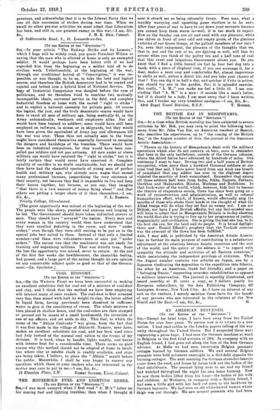[To THE EDITOR OF THE "SPECTATOR."]
SI1A,—In your article " The Railway Strike and its Lessons," which I hope will be widely read, you quote President Wilson as saying that the man who is allowed at home is only an exempted soldier. It would perhaps have been better still if we had regarded him from the beginning as a soldier told off to do civilian work. Unfortunately, at the beginning of the war, through our traditional hatred of "Conscription," it was im- possible, or was thought to be so, to take the bold and logical course, and therefore the British democracy had to be coaxed and cajoled and bribed into a hybrid kind of National Service. The bogy of Industrial Compulsion was dangled before the eyes of politicians, and we therefore tried to combine two mutually incompatible ideals, universal service in the field, and complete Industrial freedom at home with the sacred " right to strike" and to exploit a national necessity for private gain. Of course the logical, the just, and the truly democratic course would have been to enrol all men of military age, being medically fit, in the Army automatically, workmen and employers alike. Not all would have been trained as soldiers; some would have still been employed on railways, in mines, or in shipyards, but they would have been given the equivalent of Army pay and allowances till the war was over. Thaw thus not actually sent to the front might have considered themselves especially favoured in escaping the dangers and hardships of the trenches. There would have been no industrial compulsion, for they would have been com- pelled qua soldiers and not qua artisans. All men under or above military age would have retained the "right to strike," but it is fairly certain they would never have exercised it. Complete equality of sacrifice is no doubt unattainable, but we should not then have had the shameful spectacle of young men of perfect health and military age, who already earn wages that exceed many professional incomes, jeopardizing the very existence of their country, not because they find it impossible to live and keep their homes together, but because, as you say, they imagine "that there is a vast amount of money flying about" and that others are getting a larger share of it than themselves.—I am,
[The great opportunity was missed at the beginning of the war. The people were like sheen, puzzled and anxious and longing to be led. The Government should have taken unlimited powers at once. They should have "arrayed" the nation. Every man and every woman in the country would then have understood that they were enrolled definitely in the cause, and were "under orders," even though they were still waiting to be put on to the special jobs best suited to them. Instead of that only a limited number—and those were volunteers—were at once put "under orders." The excuse was that the machinery was not ready for training and organizing millions. That was strictly true. None the less the opportunity was missed, never to return. At the end of the first few weeks the bewilderment, the sheep-like feeling, had passed, and a large part of the nation thought its own opinion on any conceivable subject quite as good as that of the Govern- ment. —ED. Spectator.]


































 Previous page
Previous page